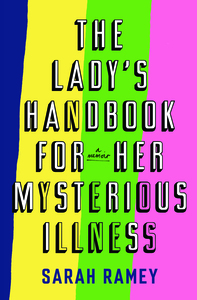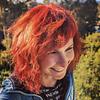You need to sign in or sign up before continuing.
Take a photo of a barcode or cover
challenging
emotional
informative
inspiring
reflective
medium-paced
I know memoirs aren't held to the same fact checking scrutiny as other non-fiction, but when a book contains this much medical content, it should have cited sources. Saying that there's been hundreds of studies on something, but not actually naming/listing a single study or report, is sketchy. Almost as sketchy as one's doctor parents prescribing them medication without informing one's actual doctors/care team.
informative
reflective
medium-paced
dark
funny
informative
medium-paced
informative
inspiring
sad
slow-paced
there were parts of this where i felt so seen i was moved to tears. it was funny at times, her story is definitely interested. i don’t wanna give it the time of a full review but someone gave it a 1 star on here and said it all: becomes super terf-y, tries to couch it in “all cultures have masculine and feminine energies” (zero citations btw, and im a cultural anthropologist so. would love to know where you are getting this universalism from lol). i was weary about the “save all women” angle from the beginning but it was mostly fine until she gets to her feminism chapter near the middle and it just tanks. just super disappointing. she also says that all other oppressions (Black people, queer people mentioned in particular) are simply experiencing what women have always experienced. jesus.
While I enjoyed this when I did pick it up, it has now gone through an entire library cycle without my picking it up again, so apparently it's just not the right time.
I was really interested in this book because I am a woman with migraines, which while not exactly mysterious, are incredibly poorly understood and difficult to treat effectively. I did not think I would find a miracle cure in it, but you know, there's value in being seen, and maybe I'd find something relevant.
So, first: don't read if you're squicked by medical details. I had to put the book down multiple times because I was just. Not okay with some of the descriptions.
The first half of the book was the story of how Ramey first began to experience her illness, and how she tried to treat it, and the general sheer fuckery that is being in the medical system, particularly with symptoms that don't resolve and particularly with issues that are usually "women's issues" (fibro, ME/CFS, migraine, Ehlers-Danlos, and oh so many more.) She was treated poorly by most of her medical professionals (gaspingly so in some places), and tried an array of things, none of which did much for her.
That part--well, I don't want to say it was "fine," because obviously none of this is fine, but that part was more or less what I expected from the book.
But right about 50%, it goes on a hard left turn into 70s white-feminism "power of the feminine" in a way that felt really uncomfortably trans-exclusionary, despite the nod to "women and some men". She occasionally drops a light reference to LGBT people, but the entire thing felt way too unmoored from reality for me (and I say this as a semi-practicing pagan who actively accepts the presence of the divine feminine in life.)
Here's the thing. Medicine treats AFAB bodies (and trans bodies) as less-than, which is indeed called out in this book. Our illnesses are treated less seriously; crippling conditions that only affect women are given less attention, research, and money than male pattern baldness or erectile dysfunction, by orders of magnitude. I'm not arguing about that. And yes, some of those issues have to do with organs or hormones that specifically affect AFAB bodies. But that didn't feel like what she was talking about; it was extremely reminiscent of reading Starhawk, and that is not a compliment.
It was pretty much all downhill from there into shaming the usual American diet (not that it doesn't deserve that), and here we get into my other issue with this book.
Privilege.
This book is fucking dripping in white-rich-woman privilege.
Ramey mentions often that she's the daughter of two doctors. She moves across the country multiple times to chase various treatments and has a lot of medical tests and procedures that aren't covered by insurance (which she mentions that the type of medicine she recommends is not covered by insurance.) She does not appear to hold down a job for most of the time period she describes - not unexpected, given her illness - but she's able to eat whatever, pursue yoga and acupuncture as her full-time lifestyle, choose her doctors which are all Mayo-Clinic-caliber--which, to be clear, in a perfect world we would all be able to tend our health in this way, but she straight up refuses to acknowledge that not everyone can do this. She talks about how women with this constellation of mysterious illnesses must do various things, like eat whole foods and sleep enough and so on and so on, and occasionally there's a half assed effort to nod to the idea that this is expensive, but: if you want to have a roof over your head, sometimes you don't get a fucking choice.
There's also dismissive commentary about how autoimmune diseases don't exist in the developing world--ARE YOU FUCKING KIDDING--and while her medical experiences are indeed horrific, they are sadly also pretty standard, or worse if you are not a white woman with money, which is not acknowledged at all. I want to be clear that I'm not asking her to compete in the Oppression Olympics, but some acknowledgment that despite everything, she was treated better than many women in this situation seems necessary.
This book was reasonably promising for the first half and then crashed into borderline-TERF 70s-feminism discourse and "just eat whole foods it'll be fine!" (There is, to be strictly fair, some mention that we need to shift our social structures to value health and some commentary on how to accomplish that, but it gets lost in the White Woman Special Feminine Mystique crap.)
I'm so disappointed.
So, first: don't read if you're squicked by medical details. I had to put the book down multiple times because I was just. Not okay with some of the descriptions.
The first half of the book was the story of how Ramey first began to experience her illness, and how she tried to treat it, and the general sheer fuckery that is being in the medical system, particularly with symptoms that don't resolve and particularly with issues that are usually "women's issues" (fibro, ME/CFS, migraine, Ehlers-Danlos, and oh so many more.) She was treated poorly by most of her medical professionals (gaspingly so in some places), and tried an array of things, none of which did much for her.
That part--well, I don't want to say it was "fine," because obviously none of this is fine, but that part was more or less what I expected from the book.
But right about 50%, it goes on a hard left turn into 70s white-feminism "power of the feminine" in a way that felt really uncomfortably trans-exclusionary, despite the nod to "women and some men". She occasionally drops a light reference to LGBT people, but the entire thing felt way too unmoored from reality for me (and I say this as a semi-practicing pagan who actively accepts the presence of the divine feminine in life.)
Here's the thing. Medicine treats AFAB bodies (and trans bodies) as less-than, which is indeed called out in this book. Our illnesses are treated less seriously; crippling conditions that only affect women are given less attention, research, and money than male pattern baldness or erectile dysfunction, by orders of magnitude. I'm not arguing about that. And yes, some of those issues have to do with organs or hormones that specifically affect AFAB bodies. But that didn't feel like what she was talking about; it was extremely reminiscent of reading Starhawk, and that is not a compliment.
It was pretty much all downhill from there into shaming the usual American diet (not that it doesn't deserve that), and here we get into my other issue with this book.
Privilege.
This book is fucking dripping in white-rich-woman privilege.
Ramey mentions often that she's the daughter of two doctors. She moves across the country multiple times to chase various treatments and has a lot of medical tests and procedures that aren't covered by insurance (which she mentions that the type of medicine she recommends is not covered by insurance.) She does not appear to hold down a job for most of the time period she describes - not unexpected, given her illness - but she's able to eat whatever, pursue yoga and acupuncture as her full-time lifestyle, choose her doctors which are all Mayo-Clinic-caliber--which, to be clear, in a perfect world we would all be able to tend our health in this way, but she straight up refuses to acknowledge that not everyone can do this. She talks about how women with this constellation of mysterious illnesses must do various things, like eat whole foods and sleep enough and so on and so on, and occasionally there's a half assed effort to nod to the idea that this is expensive, but: if you want to have a roof over your head, sometimes you don't get a fucking choice.
There's also dismissive commentary about how autoimmune diseases don't exist in the developing world--ARE YOU FUCKING KIDDING--and while her medical experiences are indeed horrific, they are sadly also pretty standard, or worse if you are not a white woman with money, which is not acknowledged at all. I want to be clear that I'm not asking her to compete in the Oppression Olympics, but some acknowledgment that despite everything, she was treated better than many women in this situation seems necessary.
This book was reasonably promising for the first half and then crashed into borderline-TERF 70s-feminism discourse and "just eat whole foods it'll be fine!" (There is, to be strictly fair, some mention that we need to shift our social structures to value health and some commentary on how to accomplish that, but it gets lost in the White Woman Special Feminine Mystique crap.)
I'm so disappointed.
For so long I thought I was alone and that something was wrong with me for all my health issues (gastroparesis, GERD, adenomyosis, PCOS, the list goes on). One of my doctors had told me to go on a no dairy, no gluten, no caffeine, no alcohol diet - which I named the no fun diet. Eight months ago I attempted it for three months and abandoned it after a follow up appointment. I now see that I was not ready to accept that was what I needed to do. I was still looking for a magic pill to fix all my problem. This book helped me process my emotions even crying at points in her story. For the first time in a long time I was seen and my thoughts were valid. There were times I felt like the book continued to drag on, but for the most part I felt like Sarah was speaking directly to me. If you are looking for a quick cure, this book is not it - but if you are looking to change your mind self of your current condition and unlock possible resources and tests to put you back on track then read the book!
Large print made it too hard to read





